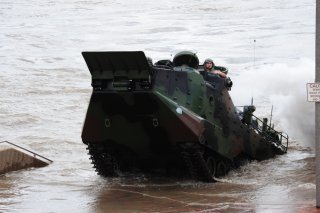General Berger’s Proposed Changes Will Ensure Marine Corps’ Independence
Berger’s vision seeks to cement the service’s unique characteristics and prepare the Marines for a contingency in the vastness of the Indo-Pacific.
Gen. David Berger, the thirty-eighth commandant of the United States Marine Corps, has ignited a heated debate within the national security community by enunciating his structural changes to reposition the Marine Corps for the era of great power competition. One of the main premises behind Berger’s 2019 Commandant’s Planning Guidance is the need to reclaim the service’s naval origins with amphibious warfare as its sine qua non.
“Marine Corps integration into the Fleet via composite warfare,” he writes, “will be a prerequisite to the successful execution of amphibious operations: Marines cannot be passive passengers en route to the amphibious objective area.”
Berger’s concern, of course, is China’s anti-access/area denial (A2/AD) strategy designed to create formidable hurdles for U.S. naval forces operating in the western Pacific. To develop a light and mobile force able to quickly enter contested zones, Berger argues for replacing heavy expensive platforms with multiple small ones for operational dispersion.
In short, the future Marine Corps “must be able to fight at sea, from the sea, and from the land to the sea; operate and persist within range of adversary long-range fires; maneuver across the seaward and landward portions of complex littorals; and sense, shoot, and sustain while combining the physical and information domains to achieve desired outcomes.”
Berger’s idea to transform the service has earned much opprobrium, even from respected retired Marine generals who are reportedly using their influence to lobby Congress to derail the proposed changes.
However, apart from preparing the Marine Corps for the rapidly changing security environment in the Indo-Pacific, the return to the service’s traditional functions will ensure its long-term independence. Arguably, no other military branch has been more constantly scrutinized throughout its existence than the Marines whose strategic concept has been either questioned or rendered obsolete. There have also been periodic calls for the service to be absorbed by the Army and Navy.
Often at the heart of these arguments is the skepticism over the feasibility of amphibious warfare under evolving modern conditions. Landing ashore during high-end conflicts is a tedious undertaking, as the Allied Powers learned during their operation at the Gallipoli Peninsula during World War I. By implementing a basic A2/AD tactic of placing naval minefields, the Ottomans were able to sink several battleships and force the Allied navy to withdraw under sustained gunfire.
That failure resulted in the British government calling the era of amphibious warfare over. But then came World War II with some of the brilliant and decisive amphibious operations, including Gen. Douglas MacArthur’s campaigns in New Guinea and the Philippines when the perseverance of Allied forces took them all the way to the center of the Japanese Empire. The landings in Normandy and Sicily also helped recover the much-suffered reputation of amphibious operations.
But the debate over the practicality of amphibious landings was far from over. Several years later when planning for the Battle of Inchon, an amphibious invasion during the Korean War, MacArthur faced fervent opposition from a military establishment that was averse to such operations.
Prominent figures including Generals Omar Bradley and J. Lawton Collins regarded amphibious warfare redundant and too risky to even consider. The Navy similarly objected citing potential logistical and technical issues.
Marines, who once again were under heavy strain due to ongoing attacks against their service’s strategic rationale, went along with MacArthur, who convinced the Corps that amphibious warfare would ensure its continuity as a separate branch. The invasion turned out to be a major success shifting the strategic reality on the ground in favor of the United Nations Command.
The inherent risk of such operations is a recurring issue, as evidenced by Gen. Norman Schwarzkopf’s reluctance to approve the Marine landing in Kuwait and Iraq during Operation Desert Storm in 1990. Sea Mines, similar to the ones used in Gallipoli, were his primary concern.
This debate is here to stay. But what’s important is to recognize the everchanging geopolitical landscape and adapt accordingly. As Mackubin Owens, a senior fellow at the Foreign Policy Research Institute and a former marine, posits, Berger’s vision—albeit risky—is necessary to move beyond the status quo. This would mean securing the Corps’ strategic concept by turning the service's operational rationale into a potential tool to blunt China’s A2/AD strategy.
Maintaining its independence should be a top priority for the Marine Corps. Berger’s vision seeks to cement the service’s unique characteristics and prepare the Marines for a contingency in the vastness of the Indo-Pacific.
Erik Khzmalyan is a geopolitical analyst specializing in US foreign policy and national security. He holds an MA in Statecraft and National Security Affairs from The Institute of World Politics in Washington, DC.
Image: Flickr

